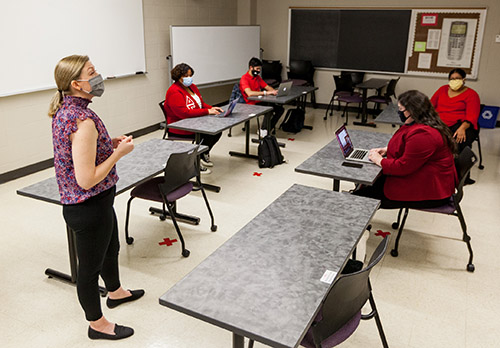WKU News
WKU graduate students apply job analysis to address issue of social justice and law enforcement
- WKU News
- Tuesday, December 1st, 2020

As students in WKU’s Industrial/Organizational Psychology master’s program train for careers in human resources and organizational development and effectiveness, they’ve spent their first semester tackling a nationwide issue – social justice and law enforcement.
“One of things we do in our program is try to give students applied projects to take the skills and knowledge they’re learning in class and apply that to a practical context,” said Dr. Katrina Burch, assistant professor in the Department of Psychological Sciences.
In a year marked by protests, the I/O psychology field has been examining ways to address systemic issues that minorities face, Dr. Burch said.
The six students in her PSYS 570 – Job Analysis and Compensation course have been assessing how job analysis can inform the recruitment and selection of law enforcement in addressing systemic racism. “They’re very passionate about the project and how the field they’ve chosen to specialize in can help,” Dr. Burch said.
The students have conducted interviews with members of police departments at WKU, Bowling Green, Lexington and Nashville. They are wrapping up the project and will be presenting a report to participating agencies on Wednesday (Dec. 2).
“We wanted to see how job analysis can mitigate systemic racism and we wanted to look and see what type of job analysis techniques can include minorities and women more often,” said Shelby Davis, a graduate student from Waldorf, Maryland.
Students focused on ways to break down barriers for minorities and improve diversity in law enforcement, including better recruitment of job candidates and increased involvement in the community.
“This is such an important topic to talk about right now,” said Davis, who has taken a leadership role in the project.
“I just found that I naturally started leading the meetings and guiding the conversations we had about the project,” Davis said. “I also made sure we had candid conversations about systemic racism and the social injustices that we face, especially being a black woman. This project is really important to me because it is my community that is affected by police brutality so often.”
In the project, Dr. Burch said, students are seeking to make recommendations on how job analysis can better inform the recruitment and selection of law enforcement members. “They’re writing a paper where they’re providing some background on the tensions between law enforcement and the social justice movements that are going on. But then also making recommendations on how this specific specialty within I/O psychology can break down some of these barriers,” she said.
For example, preliminary recommendations support establishing standard educational requirements in job descriptions and focusing on recruitment of law enforcement officers from the communities they serve as a means of enhancing diversity and addressing the stigmas associated with policing.
Davis said talking with police personnel also helped break down barriers for her. “They opened my mind up so I wasn’t so close-minded about police officers,” she said. “They did help me remember that police officers are human and there are a lot of things that they deal with that I can’t imagine dealing with.”
Dr. Burch agreed. “I think it was important for the students to recognize this occupation shouldn’t be vilified because I think a lot of police are experiencing some level of discrimination especially in some locations more than others given the increase in protests,” she said. “It was a way for students to understand the role of law enforcement in helping with the biases they may have around law enforcement. But then understanding how the work that we do as I/O psychologists can improve law enforcement and the work they do.”
- For more about WKU’s I/O Psychology program, visit https://www.wku.edu/psychological-sciences/grad/io/index.php
Contact: Dr. Katrina Burch, katrina.burch@wku.edu
Some of the links on this page may require additional software to view.

